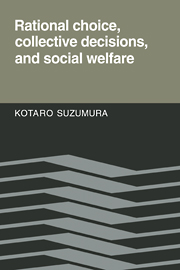Book contents
- Frontmatter
- Contents
- Preface
- Chapter 1 Prologue
- Chapter 2 Rational choice and revealed preference
- Chapter 3 Arrovian impossibility theorems
- Chapter 4 Simple majority rule and extensions
- Chapter 5 The fairness-as-no-envy approach in social choice theory
- Chapter 6 Impartiality and extended sympathy
- Chapter 7 Individual rights and libertarian claims
- Chapter 8 Epilogue
- Notes
- Bibliography
- Index
Chapter 7 - Individual rights and libertarian claims
Published online by Cambridge University Press: 07 October 2011
- Frontmatter
- Contents
- Preface
- Chapter 1 Prologue
- Chapter 2 Rational choice and revealed preference
- Chapter 3 Arrovian impossibility theorems
- Chapter 4 Simple majority rule and extensions
- Chapter 5 The fairness-as-no-envy approach in social choice theory
- Chapter 6 Impartiality and extended sympathy
- Chapter 7 Individual rights and libertarian claims
- Chapter 8 Epilogue
- Notes
- Bibliography
- Index
Summary
What, then, is the rightful limit to the sovereignty of the individual over himself? Where does the authority of society begin? How much of human life should be assigned to individuality, and how much to society?
Each will receive its proper share, if each has that which more particularly concerns it. To individuality should belong the part of life in which it is chiefly the individual that is interested; to society, the part which chiefly interests society.
John Stuart MillIntroduction
Some libertarians in the tradition of Locke, Mill, and de Tocqueville would claim that there ought to exist in human life a certain minimum sphere of personal liberty that should not be interfered with by anybody other than the person in question. The question where exactly to draw the boundary between the sphere of personal liberty and that of collective authority is a matter of great dispute, and, indeed, what a libertarian might claim is not unequivocal in the first place. Nevertheless, a claim for the inviolability of a minimum extent of individual libertarian rights seems to be deeply rooted in our social and political ideals.
Granting the existence of a minimum sphere of personal liberty, can we design an otherwise democratic collective choice rule in such a way that each person is empowered to decide what should be socially chosen, no matter what others may claim, in choices over states that specifically concern him?
- Type
- Chapter
- Information
- Rational Choice, Collective Decisions, and Social Welfare , pp. 180 - 238Publisher: Cambridge University PressPrint publication year: 1983



